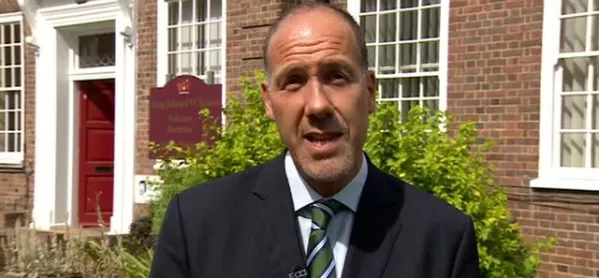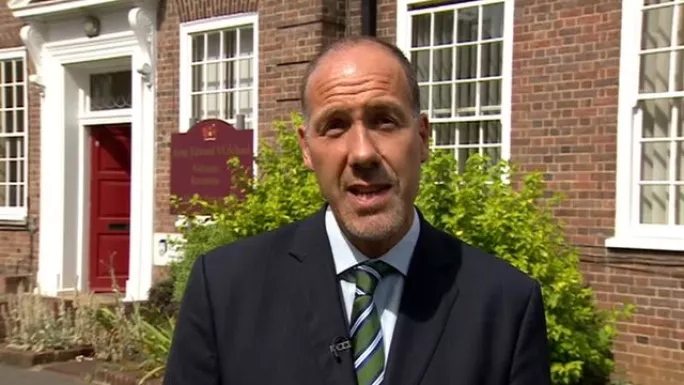Geoff Barton on A-level results: “I’d be surprised if there were no surprises”

Geoff Barton, headteacher of King Edward VI School in Bury St Edmunds, writes:
So after a week of pre-emptive strikes, here we are: another A-level results day touches down.
It was Ofqual’s chief executive, Glenys Stacey, who issued the first warning about the possible impact of the flurry of changes to examinations.
She said: “Because of the totality of the changes, all schools are likely to be affected. Direct comparisons can’t be made because you won’t be comparing like with like.”
That will especially be the case one week from today when GCSE results are issued. But we also know that A-level students picking up their exam results this morning are the first cohort in recent years who haven’t been able to take January examinations - even though these were originally a built-in design feature of the AS and A2 courses they embarked upon.
That may, for some students, have affected how they have done. It certainly means that we aren’t exactly comparing like with like from last year to this.
In the sixth form at our proud comprehensive school in Suffolk, 163 students are receiving their results today. We have seen some surprises in some students’ results - with an increase in the overall number of A* grades, but also some predicted Bs coming out as Cs.
But common sense and experience tells me that this is how it should be. We aren’t an exam factory and A-levels weren’t designed for robots. Indeed, I’d be more surprised if there were no surprises.
The part of Glenys Stacey’s comments I especially welcomed was her strong nudge that we should all - including governors and parents - exercise care before leaping to simplistic conclusions from last year’s results to this.
We know, after all, that too many school leaders disappear each year from their posts either because of disappointing results, disappointing Ofsted inspections or the publication of disappointing performance tables. All of these can be traced back to the results unleashed today and next week, and to the small media frenzy which always surrounds them.
Yesterday, we saw a high-powered alliance of school leaders launching a different preemptive strike on what they (rightly) see as the mechanistic, politicised use of league tables.
A combination of the Association of School and College Leaders, the National Association of Head Teachers and the United Learning group talk of publishing their own alternative tables earlier than the official versions, which they regard as discredited by years of political tinkering.
What’s good about this is that it may be of a sign that a school system that felt in lockdown during those long Govean days may be starting to regain its self-confidence and its voice. Instead of whinging on the sidelines, school leaders are proposing something new.
That, in principle, must be welcome.
The problem is that in proposing different league tables it’s validating the whole concept of league tables. And it’s assuming that parents ever believed that a set of icy statistics told them everything they needed to about a school.
That would be like assuming that going to a three-rosette restaurant from the Michelin Guide would guarantee a more enjoyable dining experience than lunch with friends at Pizza Hut. It may do, but it may not.
Because what we all know about restaurants and schools is that context is everything.
School leaders like me are right to bang on about the importance of extracurricular activities - music, sport, debating societies and suchlike. But as soon as we start trying to build those facets of the best schools into performance tables of some form, we’ll open ourselves to criticism that we - just like the government - are involved in skullduggery.
Do we really want to start counting how many students are in our orchestra or school choir to prove that my extra-curricular programme is bigger than yours? It’s the very system we should be rejecting.
All of which is a reminder, as ever, of how - in England at least - results are not often enough about the students at the heart of them and too much about other things - school performance tables, politics, and annual state-of-the-nation pontification.
If Nicky Morgan wants to make her mark she might start by congratulating students and their teachers on today’s A-level results and empathising with sleepless parents (I’m speaking from personal experience on this last bit).
Then she might say that she agrees with Ofqual that no one, including those in the media, should rush into making lazy comparisons from one year to the next based on examinations that have themselves changed.
Then she could agree with school leaders that performance tables have lost their credibility and involve them directly in the once-and-for-all reform.
That will leave the rest of us free to concentrate on today’s most important task: to celebrate the successes - and to mop up those occasional tears - as another results day unfolds around us and our students.
Keep reading for just £1 per month
You've reached your limit of free articles this month. Subscribe for £1 per month for three months and get:
- Unlimited access to all Tes magazine content
- Exclusive subscriber-only stories
- Award-winning email newsletters




